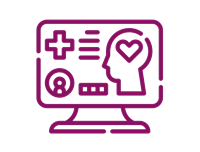NEWS
Tuesday 12 April 2022
Mental health at a time of crisis – what can you do to support your people?
Have you ever spent your precious free time flicking through endless streams of negative news? You’re not alone. There’s even a name for it… “Doomscrolling”! A word that has entered the zeitgeist in recent years and means the “act of spending an excessive amount of screen time devoted to the absorption of negative news”.1 And, of course, an increased consumption of predominantly negative news can have a detrimental impact on our mental health.
The phenomenon will be wearily familiar to multinationals and billions of employees worldwide who have spent the past two years adapting to, and trying to stop worrying about, a pandemic. But even as COVID seems to be slowly coming under control in many parts of the world, there’s more to worry about. Conflict in Ukraine, families displaced and talk of nuclear weapons filling our news timelines are cause for concern for many.
It’s safe to say there’s been plenty of negative stories for people to find while scrolling through news and social media sites. But what impact has the barrage of negative news and testing times had on our mental health?
COVID-19 and mental health
It’s safe to say living through the COVID-19 pandemic has had a hugely negative impact on mental health worldwide. The World Health Organization (WHO) estimates, in the first year of the pandemic, global prevalence of anxiety and depression increased by 25%.2
 Dr Tedros Adhanom Ghebreyesus, WHO Director-General says, “The information we have now about the impact of COVID-19 on the world’s mental health is just the tip of the iceberg. This is a wake-up call to all countries to pay more attention to mental health and do a better job of supporting their populations’ mental health.”
Dr Tedros Adhanom Ghebreyesus, WHO Director-General says, “The information we have now about the impact of COVID-19 on the world’s mental health is just the tip of the iceberg. This is a wake-up call to all countries to pay more attention to mental health and do a better job of supporting their populations’ mental health.”
But it isn’t just the concern of governments. Helping employees to address their mental health is a major challenge for employers, too. Mental health has been severely tested around the world in the past few years as global crises have increased the pressure on employees worrying about their physical and financial health while trying to cope in the face of relentlessly negative news. There’s a lot that employers can do to support their people in these tough times. And thankfully, attitudes towards mental health in the workplace are changing for the better.
“The information we have now about the impact of COVID-19 on the world’s mental health is just the tip of the iceberg.”
Government action on mental health
The WHO’s pulse survey on the continuity of mental health service shows 90% of countries are working to provide mental health and psychosocial support to COVID-19 patients and responders.
 At last year’s World Health Assembly countries focused on the need to develop and strengthen mental health and psychosocial support services in order to strengthen preparedness, response, and resilience for future public health emergencies.
At last year’s World Health Assembly countries focused on the need to develop and strengthen mental health and psychosocial support services in order to strengthen preparedness, response, and resilience for future public health emergencies.
But that requires investment. WHO’s most recent Mental Health Atlas shows that in 2020 governments worldwide spent just over 2% of health budgets on mental health and many low-income countries have fewer than one mental health worker per 100,000 people.
Devora Kestel, Director of the Department of Mental Health and Substance Use at WHO says: “While the pandemic has generated interest in and concern for mental health it has also revealed historical underinvestment in mental health services.”2 Can employers help provide access to these services when the public health system doesn’t?
Attitudes to mental health in the workplace – is the taboo shifting?
How are attitudes to mental health changing? In the past talking about mental health issues was taboo and employees might have been scared of the impact admitting to them might have on their careers. But that appears to be changing. 2022 research in the UK found the pandemic has had a positive impact on the perception of mental health at work – more than two thirds (68%) of people said they believe it has made employers more aware of mental health issues.3
Similar surveys in the US show 87% of adults believe poor mental health is nothing to be ashamed of talking about, while 86% agree that it is possible to recover from mental illness.4
 Anyone looking on social media can see that people are much more open in talking about their mental health, even on “professional” social media sites like LinkedIn.
Anyone looking on social media can see that people are much more open in talking about their mental health, even on “professional” social media sites like LinkedIn.
But there may be generational differences in attitudes to mental health at work – research by global recruitment firm Robert Walters found younger workers are clashing with older workers over attitudes to work life balance and wider mental health issues. Around 40% of UK office workers are estimated to be at odds with either millennials or baby boomers over workplace attitudes.5
Data from our global private medical landscape report had some interesting findings when it came to mental health. Our 2020 claims data shows, as a percentage of total paid claims, mental health costs increased year-on-year in many markets. For instance, in Chile, mental health claims have increased by 22% from the year before and in the UK, mental health claims representation has gone up by 49% when compared to 2019. In Taiwan and Thailand, we saw mental health claims in our data for the first time. Is the taboo shifting? Are people more comfortable admitting to mental health conditions and getting treatment for them?
Unfortunately, this doesn’t seem to be the case everywhere – mental health accounts for just 0.3% of claims in Latin America in our data (globally it is 233% higher). Research shows there is still a stigma associated with poor mental health in Latin America. The view that mental health conditions will “bring disgrace” to a family plays a key role in many not seeking treatment.6
In Latin America the view that mental health conditions will ‘bring disgrace’ to your family plays a key role in many not seeking treatment.
Around the world
AXA’s Mind Health Study 2022 interviewed more than 11,000 participants in 11 markets across Europe and Asia. Its findings were bleak.
-
44% of those surveyed said they had felt happy or had experienced joy in the past year - people were happiest in China (57%), Switzerland (54%) and Spain (50%) and least happy in France (39%), Italy (37%) and Japan (27%)
-
37% believe the public health system in their country was adequate for mind health - the UK (23%) and Italy (24%) were least supportive compared with China (65%) and Switzerland (58%)
-
37% say their employers provide good support for mind health underlining the role that employers can play - Japan was at the lowest at 20% with Hong Kong at 32%
Stephen Bevan, of the Institute of Employment Studies, says in the report: “Having looked at data on mental health from Europe and Asia recently, there is an issue around stigma and disclosure, even in anonymous surveys. Having problems with mind health still is not considered an acceptable reason for taking time off in some parts of the world.”7
Mental health in times of trauma
Events such as political unrest, accidents and sudden deaths are rare, but we are living in truly unprecedented times. And on top of what we are seeing in the news, many people will be going through traumas unrelated to the crises such as bereavement, sickness and financial worries.
It is perfectly normal in abnormal times for people to feel overwhelmed as their minds and bodies attempt to make sense of what is happening. Most people do recover or learn to adapt. But it is important to seek help if that doesn’t seem to be happening – in normal times emotions following a traumatic event will gradually reduce in intensity over four to six weeks.
“Having problems with mind health still isn’t considered an acceptable reason for taking time off in some parts of the world.”
Building resilience to boost mental health
As we all try to cope through difficult times, learning to be resilient can help us train our brain to deal with hard times. Resilience is defined as the “ability to adapt to difficult situations. When stress, adversity, or trauma strikes, you still experience anger, grief, and pain, but you can keep functioning — both physically and psychologically.
Resilience is not about putting up with something difficult, being stoic or figuring it out on your own. In fact, being able to reach out to others for support is a key part of being resilient.8
There are four basic types of resilience: physical resilience which applies to maintaining health; cognitive resilience which applies to maintaining mental focus; e motional resilience which helps people face challenges with a positive attitude; and spiritual resilience which focuses on finding a higher purpose or selfless perspective.9
motional resilience which helps people face challenges with a positive attitude; and spiritual resilience which focuses on finding a higher purpose or selfless perspective.9
Building resilience can help with stress and anxiety – it does not mean people will not suffer from them but that they will be able to cope.
How to build resilience
-
Make connections with others – be comfortable accepting help
-
Avoid seeing challenges as insurmountable problems
-
Accept that change is stressful and is part of living
-
Establish realistic goals and move forward
-
Make decisive actions to meet the demands of daily life
-
Practice good self-care and self-discovery
-
Nurture a positive view of yourself
-
Keep things in perspective
-
Maintain a hopeful outlook
-
Become stress hardy – keep your body fit and healthy10
How can employers help their people?
US President Joe Biden made mental health a prominent part of his recent State of the Union address saying he would “get all Americans the mental health services they need” and pledged to achieve “full parity between physical and mental health care” in insurance coverage.
President Biden’s State of the Union address pledged to “get all Americans the mental health services they need” and achieve “full parity between physical and mental health care.”
The White House outlined a national strategy to “transform how mental health is understood, perceived, assessed, treated, and integrated” in and out of healthcare settings. The overall goal is to invest in strengthening America’s capacity to deliver mental health services and connect more Americans to care.11
It is an important pledge and one of the world’s largest economies making such a big commitment to mental health shows how times are changing.
But employers have a major role to play and shouldn’t just wait for governments and public healthcare systems to treat mental health conditions. Employers are realising they have a duty of care to do all they reasonably can to support their employees’ health, safety and wellbeing – whether that is physical or mental health.
Here are just a few ideas of how multinationals can help their people.
-
Build a culture of openness where mental health is not a taboo subject and employers are open and fair with employees. Compassion and understanding is key.
-
Train managers to help them spot signs of mental health issues and respond in the most effective way.
-
Not everyone can be a mental health expert, but companies can train mental health first aiders who can be a point of contact for employees experiencing mental health issues or emotional distress. That can range for having a conversation with employees to supporting them into getting help.
-
Run awareness and education campaigns to help their people build resilience techniques and learn different ways to cope with trauma and difficult situations.
-
Companies can – and many do – also offer mental health services such as access to counselling and mental health helplines through employee assistance programmes (EAP) or work with telemedicine providers who offer a tele mental health service.

More than just a duty of care
Supporting employees with their mental health, particularly in turbulent times like those we have and are still experiencing, isn’t just important because of a duty of care – it has real business impacts too.
There is acceptance that mental health issues are costly for employers and the economy. The global cost of mental ill-health through lost productivity, absences and staff turnover is estimated to be around US $2.5 trillion annually.
And a study in Australia last year estimated workplace mental health issues cost the economy AUS $200 to $220 billion a year with 45% of mental health issues affecting workers caused by the workplace.
While taboos and stigmas are shrinking and the world opens its eyes to the importance of positive mental health, there’s still plenty employers can do to create mental health support tailored to their different employee groups.
Not everyone can be mental health experts, but companies can train mental health first aiders who can be a point of contact for employees experiencing mental health issues or emotional distress.
Professor Miranda Wolpert, Director, Mental Health, at charitable foundation Wellcome, told the World Economic Forum’s Mental Health in the Workplace initiative that employers should, “take a broad view of what you class as mental health support and then be led by the evidence. A broad view incorporates mindfulness and mental health first aid all the way through to flexible working policies and financial wellbeing.
“Being led by the evidence means actively looking to understand which approaches work for who, in what context and why – and if that evidence doesn’t yet exist, it’s your business that will generate it so that others can learn from you.”12

1 Paige Leskin, Business Insider https://www.businessinsider.com/doomscrolling-explainer-coronavirus-twitter-scary-news-late-night-reading-2020-4?r=US&IR=T (sourced March 2022)
2 Anon, World Health Organization https://www.who.int/news/item/02-03-2022-covid-19-pandemic-triggers-25-increase-in-prevalence-of-anxiety-and-depression-worldwide (sourced March 2022)
3 Anon, Westfield Health https://www.westfieldhealth.com/blog/our-changing-attitudes-to-mental-health-key-findings (sourced March 2022)
4 Anon, American Psychological Association https://www.apa.org/news/press/releases/2019/05/mental-health-survey (sourced March 2022)
5 Anon, Robert Walters https://www.robertwalters.co.uk/content/dam/robert-walters/country/united-kingdom/files/whitepapers/the-future-of-work.pdf (sourced March 2022)
6 Anon, MAXIS GBN https://maxis-gbn.com/knowledge-centre/whitepapers/the-global-private-healthcare-landscape-%E2%80%93-a-story-told-by-maxis-claims-data/ (sourced March 2022)
7 Anon, AXA https://www.axa.com/en/press/press-releases/axa-publishes-its-annual-study-of-mind-health-and-wellbeing#:~:text=AXA%20launches%20its%202022%20edition,do%20to%20improve%20their%20wellbeing.
(sourced March 2022)
8 Anon, Mayo Clinic https://www.mayoclinic.org/tests-procedures/lo-training/in-depth/resilience/art-20046311 (sourced March 2022)
9 MAXIS Global Wellness Living a resilient lifestyle/health lifestyle flyer https://oneclient.maxis-gbn.com/#/health-wellness/toolkits (sourced March 2022)
10 MAXIS GBN trauma toolkit https://oneclient.maxis-gbn.com/#/health-wellness/toolkits (sourced March 2022)
11 Garen Staglin, Forbes https://www.forbes.com/sites/onemind/2022/03/09/biden-gives-mental-health-the-attention-it-deserves/?sh=3a265b622d71 (sourced March 2022)
12 Kelly McCain and Aidan Manktelow, World Economic Forum https://www.weforum.org/agenda/2021/01/6-global-employers-on-how-to-improve-workplace-mental-health/ (sourced March 2022)
13 Anon, Australian Unions https://www.australianunions.org.au/2021/05/14/the-cost-of-mental-health/ (sourced March 2022)
This document has been prepared by MAXIS GBN and is for informational purposes only – it does not constitute advice. MAXIS GBN has made every effort to ensure that the information contained in this document has been obtained from reliable sources but cannot guarantee accuracy or completeness. The information contained in this document may be subject to change at any time without notice. Any reliance you place on this information is therefore strictly at your own risk.
The MAXIS Global Benefits Network (“Network”) is a network of locally licensed MAXIS member insurance companies (“Members”) founded by AXA France Vie, Paris, France (“AXA”) and Metropolitan Life Insurance Company, New York, NY (“MLIC”). MAXIS GBN, a Private Limited Company with a share capital of €4,650,000, registered with ORIAS under number 16000513, and with its registered office at 313, Terrasses de l’Arche – 92727 Nanterre Cedex, France, is an insurance and reinsurance intermediary that promotes the Network. MAXIS GBN is jointly owned by affiliates of AXA and MLIC and does not issue policies or provide insurance; such activities are carried out by the Members. MAXIS GBN operates in the UK through its UK establishment with its registered address at 1st Floor, The Monument Building, 11 Monument Street, London EC3R 8AF, Establishment Number BR018216 and in other European countries on a services basis. MAXIS GBN operates in the U.S. through MAXIS Insurance Brokerage Services, Inc., with its registered office located at c/o Katten Muchin Rosenman LLP, 50 Rockefeller Plaza, New York, NY, 10020-1605, a NY licensed insurance broker. MLIC is the only Member licensed to transact insurance business in NY. The other Members are not licensed or authorised to do business in NY and the policies and contracts they issue have not been approved by the NY Superintendent of Financial Services, are not protected by the NY state guaranty fund, and are not subject to all of the laws of NY. MAR01034/0322